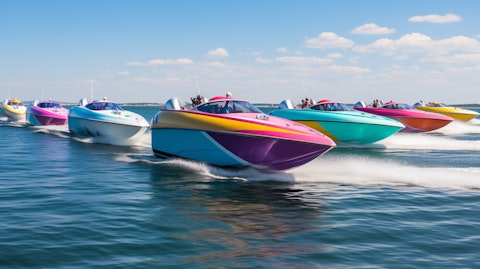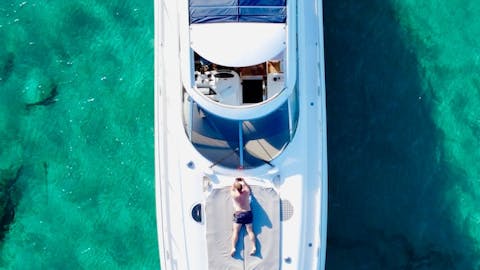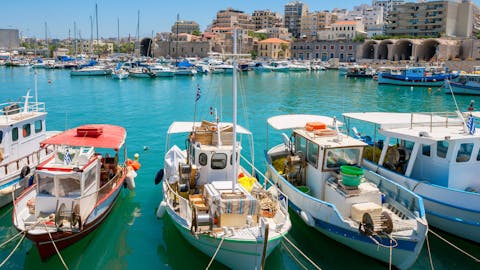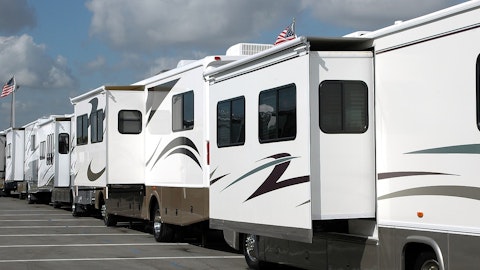Marine Products Corporation (NYSE:MPX) Q4 2023 Earnings Call Transcript January 25, 2024
Marine Products Corporation misses on earnings expectations. Reported EPS is $0.16 EPS, expectations were $0.19. MPX isn’t one of the 30 most popular stocks among hedge funds at the end of the third quarter (see the details here).
Operator: Good morning, and thank you for joining us for Marine Products Corporation’s Fourth Quarter 2023 Financial Earnings Conference Call. Today’s call will be hosted by Ben Palmer, President and CEO; and Mike Schmit, Chief Financial Officer. At this time, all participants are in listen-only mode. Following the presentation, we will conduct a question-and-answer session. Instructions will be provided at that time for you to queue up for questions. I would like to advise everyone that this conference call is being recorded. I will now turn the call over to Mr. Schmidt.
Mike Schmit: Thank you, and good morning. Before we begin, I want to remind you that some of the statements that will be made on this call could be forward-looking in nature and reflect a number of known and unknown risks. Please refer to our press release issued today along with our 2022 10-K and other public filings that outline those risks. All of which can be found at www.marineproductscorp.com. In today’s earnings call and in our press release, we’ll be referring to several non-GAAP measures of operating performance and liquidity. We believe these non-GAAP measures allow us to compare performance consistently over various periods. Our press release issued today and our website contain reconciliations of these non-GAAP measures to the most directly comparable GAAP measures. I’ll now turn the call over to our President and CEO, Ben Palmer.
Ben Palmer: Thank you, and good morning. Before we begin, I want to remind you that some of those — apologize. Appreciate everybody joining the call this morning. Our fourth quarter results reflect the ongoing normalization of retail boat sales as the multi-year post-COVID consumer demand boost subsides. In response to this slowdown, we have adjusted production to meet current order patterns as the retail channel works through excess inventory. We believe we are now in a steady balance of production and sales. However, our fourth quarter results showed significant declines versus the prior year. The difficult year-over-year comparisons are likely to persist near term. In the meantime, we will focus on making sound operational and financial decisions to position the company for sustainable long-term growth.
First and foremost, we believe our current production and shipment schedule, together with our incentive programs, should now facilitate a net reduction in dealer inventories. While still early, we are seeing an order flow that would justify a step up in production later during the first quarter. So that is an encouraging sign as we start the calendar year and get positive feedback from recent purchase. With regard to dealer inventory, I’d say we’re comfortable with the level of our products in the field, as we were disciplined in not pushing too much product into the channel. However, we do get the sense the dealer inventories overall are a bit high. To stimulate buying, we’ve returned to a historically normal level of retail incentives, which had been minimal these past few years.
We launched a program in the fourth quarter to move dealer inventory, and we see other manufacturers doing the same. Mike will comment further on promotional activities as fourth quarter results reflected an outsized impact re-initiating these programs. We’ve talked previously about economic uncertainty and the new reality of higher interest rates. Rates not only affect the monthly payments for consumers who finance their boats, but also dealers carrying cost of inventory. The interest rate outlook remains somewhat unclear, and we hope more clarity on the direction of rates and the magnitude of possible rate cuts will help consumers get more comfortable. Despite a choppy environment we will remain focused on areas of the business within our control.
We will continue to invest in R&D to support new innovative features, products, and design improvements to differentiate ourselves in the marketplace. For example, we are delivering premium interior materials, as well as showcasing additional safety and comfort benefits. We believe our reputation for innovation and product leadership has helped us maintain our leading market share over the years. Second, we are very pleased with our existing dealer network and believe we have room to grow in that infrastructure. Rather than dilute our existing dealers by pursuing overlapping or competitive distribution, we see opportunities to strengthen existing relationships even further. We recently hosted our most intensive dealer training conferences yet, arming them with our latest selling and customer education tools.
We are committed to consistently elevating our partnerships with them, positioning Chaparral and Robalo for continued success in their showrooms. We also conducted more advanced technical and repair training for dealer service personnel. We received incredible feedback from these events, and we look forward to sharing in our dealer success as a result of these collaborative efforts. Another investment we’re making is selective automation of our plants. We are increasingly using robotics on certain tasks to leverage the skill of our craftsmen and reduce unnecessary fiscal demands. This drives a safer production environment and allows our workers to focus on areas that drive maximum quality and consistency. In addition to investments inside our facilities, we have a significant solar panel installation slated for later this year.

Beyond the environmental benefits of using alternative energy sources, we expect this project to drive some cash savings. This [equipped] (ph) will have the capability to supply a sizable portion of our energy needs at our national Georgia manufacturing site. So before turning the call over, I just reiterate that we are confident in our opportunities to invest in the business and that we’ll focus on preserving as much margin as possible as we continue to assess the demands of our environment. Now, Mike will provide an overview of the financial results.
Mike Schmit: Thanks, Ben. I’ll start with a few quick financial highlights for the year and then go into some more detail about the fourth quarter. For the full year, 2023, net sales were $384 million, up slightly versus last year. Deluded EPS was $1.21, up $0.3. And EBITDA was down 4% to $52 million. We generated strong operating and free cashflow in 2023. Operating cashflow was $57 million, and after CapEx of $10 million, free cash flow was $47 million for the year. CapEx included investments in warehouses and some new trailers. During the year, we paid $19 million in dividends, and we finished 2023 with cash of $72 million and no debt. Now I’ll cover our fourth quarter results with year-over-year comparisons to the fourth quarter of 2022.
Net sales fell 35% to $70.9 million, driven by a 34% decrease in boat sold. The average gross selling price of our boats increased by 4%, which reflected changes in mix, as well as increases to cover higher input cost. However, this came as a offset by increased retail incentives recorded during the quarter. As Ben mentioned, during the quarter we launched a new retail incentive program, which applies to boats we sold to dealers during the quarter, as well as boats that remained in our dealers’ inventories that we had shipped in prior quarters. While the program had a relatively minor top line impact, there was a more noticeable impact on our gross margin. Gross profit decreased 51% to $13.5 million with a gross margin of 19% or down 620 basis points.
While gross profit and margin would have fallen due to the decline in boats sold, the reduction was exacerbated in the quarter by the incentive program launch. The fourth quarter retail incentive program represented nearly $2 million reduction in net sales and gross profit, equating to about one-third of the 620 basis point contractions. Furthermore, the majority of the incentives related to boats shipped to dealers in prior quarters. Now that we have normalized incentives and have also adjusted our production schedule to align with current demand, we expect less significant quarterly impacts and better gross margins going forward. SG&A expenses were $7.7 million in the quarter, down 38% or $4.8 million compared to last year. These expenses decreased due to costs that vary with sales and profitability, such as incentive compensation, sales commissions, and warranty expense.
Diluted EPS was $0.16 in the fourth quarter, down $0.35 in the same quarter last year. EBITDA was down 58% to $6.5 million, with EBITDA margin decreasing 490 basis points to 9.2%. Year-over-year comparisons are likely to be challenging for the next couple of quarters. But while we don’t give explicit financial guidance, directionally, we believe sequential volume and sales changes will be relatively stable in the near term, and that our cost reduction activities and normalized incentives should support gross margin improvements going forward. I’ll now turn it back over to Ben for a few closing remarks.
Ben Palmer: Thank you, Mike. In closing, I’d like to mention capital allocation and make a couple of strategic comments. First, we have maintained our attractive $0.14 per share quarterly cash dividend for our shareholders. We have a sound financial profile and believe our compelling dividend yield offers investors an attractive, tangible capital return. Next, while the second half of 2023 had some challenges, it was still a solid full year, which we generated $47 million of free cash flow. We ended the year with no debt and a highly liquid balance sheet with over $70 million in cash. One of the benefits of being conservative and disciplines during recent market buoyancy is that, as the tide turns, we are well positioned to invest prudently and opportunistically.
Silver lining of the current soft environment may be an increasing willingness of private boat makers to seek an exit. Our discipline has caused us to pass on transaction and elevated valuations on peak earnings since recent years. It has resulted in a cash accumulation that we are looking to deploy. We are targeting complementary, high-quality boat manufacturers that would enhance our distribution of brand portfolio and increase our marketing capabilities and manufacturing capabilities. And we’re very interested in increasing our scale and positioning ourselves as a buyer of choice in the M&A landscape. While difficult to pinpoint timing, it is fair to say that we do not identify — if we do not identify significant investment opportunities, we’re likely to continue our longstanding practice of returning capital to shareholders.
So before we turn the call over to questions, I’d like to thank our employees for a great year of commitment and dedication. We wholeheartedly believe we have some of the best boat makers in the industry, and their teamwork and pride underpin Chaparral’s and Robalo’s success. We received good feedback and orders from recent boat shows, and we’re looking forward to showcasing our new products in the coming weeks. With that, operator, please open the line for questions.
See also 24 Least Developed Countries in Asia in 2024 and 24 Least Developed Countries in Europe in 2024.
Q&A Session
Follow Marine Products Corp (NYSE:MPX)
Follow Marine Products Corp (NYSE:MPX)
Receive real-time insider trading and news alerts
Operator: [Operator Instructions] Your first question come from the line of Brandon Rolle with D.A. Davidson. Brandon, the floor is yours.
Brandon Rolle: All right. Good morning. Thank you for taking my questions. I guess first, just on the production and where it is right now. Could you talk about your production levels, your plan for that over the next three months compared to maybe where it was last year? And you had talked about inventory levels, you were comfortable with your inventory in the field, but overall was a little high. Would you be able to comment on areas where you felt like in the industry, inventories might be a little elevated?
Ben Palmer: Well, again, good morning, Brandon. Probably in terms of our current production level, we adjusted kind of during the third and fourth quarter, so it’s probably easier or better to talk about kind of where we go from here relative to the fourth quarter. So, we indicated here that the early results of the boat shows have been consistent to maybe slightly positive to last year. We’ve had some shows that have had some negative weather, so it was sort of hard to get a read — an appropriate read on activity levels and so forth. But we’re generally pleased with how the early results of the boat shows are coming through. We indicated, or I indicated in my comments, that with some of that recent — some of the recent orders we’ve had an indications from dealers, we think we’ll be increasing production slightly in the first quarter of next year, but we kind of adjusted it down to where during the fourth quarter that we think is an appropriate rate where we could again assess demand, watch demand, and then we’ll adjust production accordingly as we move forward.
So we’re hopeful and expect with this — with our retail program and retail incentive programs of other manufacturers that dealer inventory will clear out and it’ll make room for us to increase production further as the year goes forward. And with respect to field inventory, I think it’s been documented that some of the other segments of our industry have maybe slowed down a little bit sooner than our segment of the market. It took us a little bit — we benefited from the really strong demand that we had for our products. So I think some of the aluminum products, I think, have experienced some more inventory than they would want to have. So I’d say that’s the primary area.
Brandon Rolle: Okay, great. And you had mentioned the boat show performance is being slightly positive or encouraging at least. What were you specifically seeing at these boat shows in terms of attendance or retail sales or was it a combination of both that gave you guys a more positive view on the space moving forward?
Ben Palmer: I think it’s both of those things, right? You get a feel just seeing the attendance, the number of people and getting a sense for the excitement. Of course, the tangible measure is orders that are placed at the show. And like I said, we had similar or in some cases, slightly better sales than a year ago. And a year ago things were still relatively positive. So we take that as a good sign, but we’re certainly not going to move production up until we have firm indications of orders from our dealers. So we’re constantly assessing that.
Mike Schmit: And I’ll just add that, that’s really — that comment was referring to a lot of the boat shows here in the south, because I think in the northwest, northeast, especially, there was a lot of negative impact due to weather. So we’re sort of discounting that. I mean, the fact that they didn’t have great attendance in the northeast, northwest, because the weather is something that really — we’re not really considering that as indicative of what’s going on in the market. But, we attended the Atlanta boat show, for instance. I was at there last show, I was there this year, and the crowds were the same, if not a little bit better. And what we heard from our dealers has been mentioned was that, things definitely are about the same, if not slightly better than last year. So — and we were in a great place last year. So we were very encouraged by that.
Brandon Rolle: Okay, great. And then on your new retail incentive program, could you dig in a little deeper on, are these incentives going to the dealers on just like helping out with — are they wholesale incentives or are they retail incentives as well or a combination of both?
Ben Palmer: What we announced and talked about today and discussed the impact is a retail program. It’s a program that we work with the dealers to be able to offer to retail consumers at boat shows and in the showrooms. And of course, the impact on the fourth quarter and the program started late in the fourth quarter and it’s still in effect. So we were required, of course, for the accounting purpose to record what we think the estimate of — an estimate of the cost of that retail incentive program on sales that had already been recorded. So that’s where we talked about the fact that our gross margin this quarter was significantly impacted because we had to record an estimate of how much we thought we would pay out in retail incentives for all the boats we’ve sold up to this point, that are still in dealer inventory.




